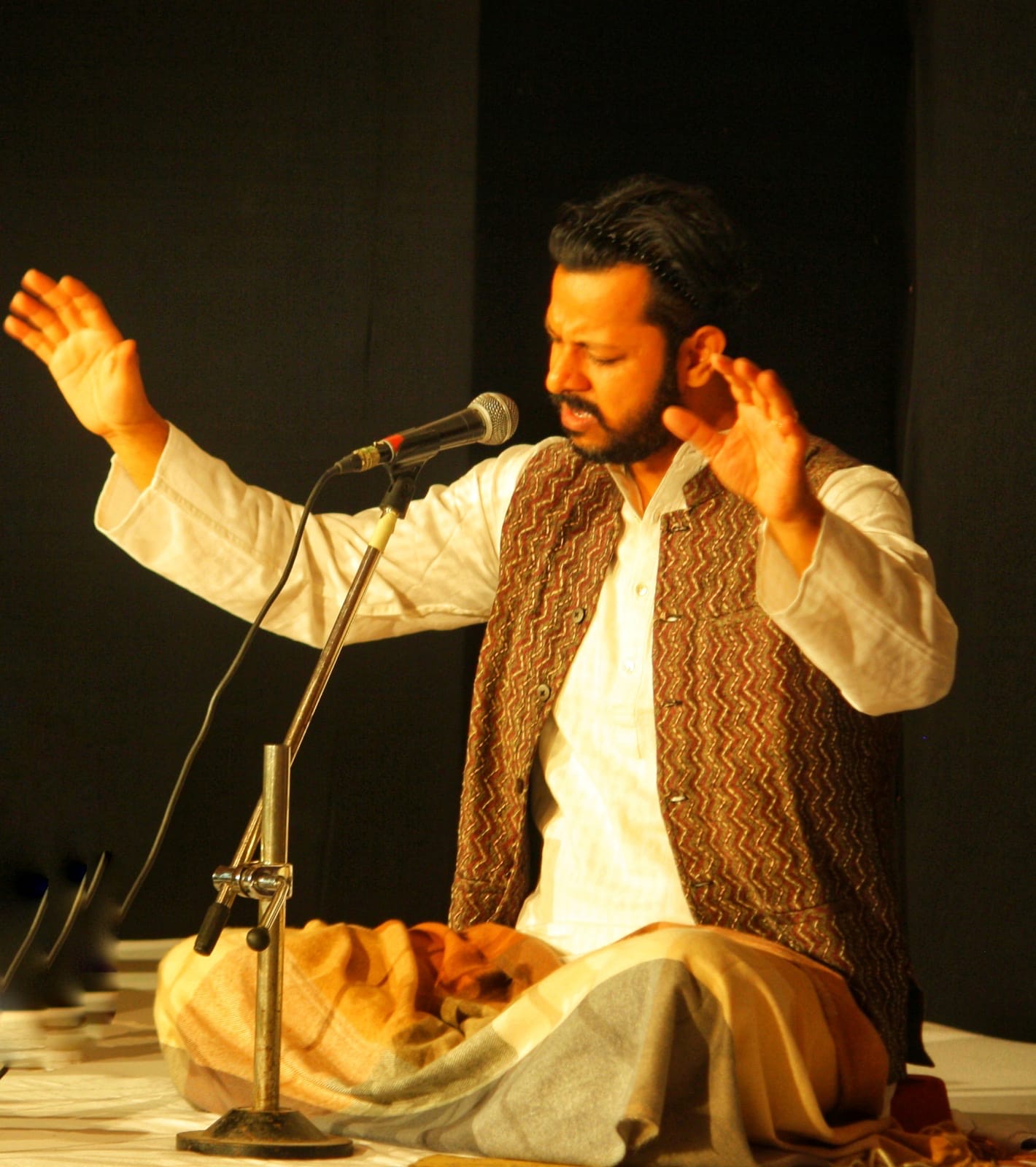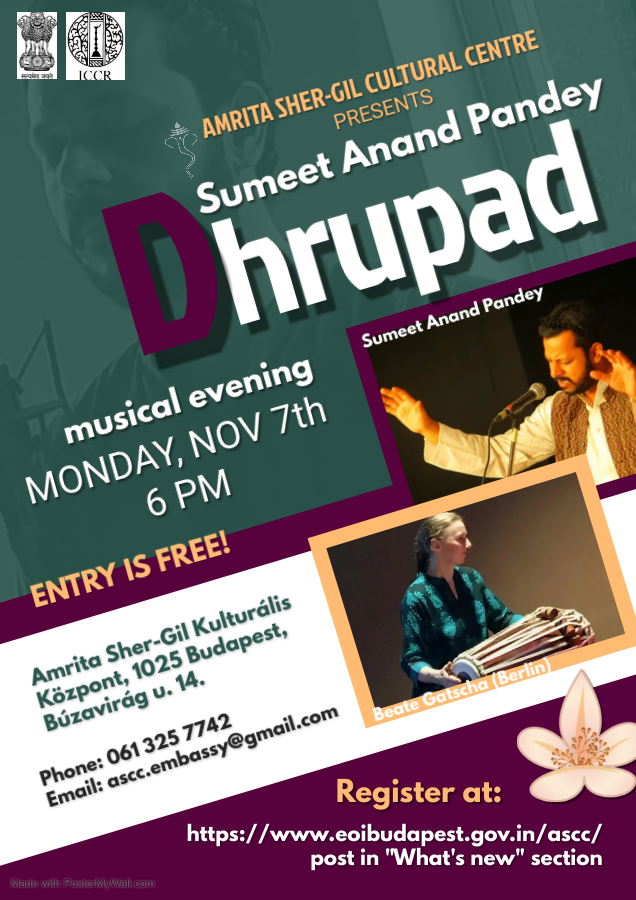Dhrupad concert by Dr Sumeet Anand
Posted on: October 27, 2022 | Back | Print
Kedves India-barátok!
Mindenkit szeretettel várunk 2022. november 7-én (hétfő) 18.00 órakor Sumeet Anand Pandey (Dhrupad) és Beate Gatscha (Pakhawaj) koncertjére az Amrita Sher-Gil Kulturális Központban.
Helyszín: Amrita Sher-Gil Kulturális Központ, 1025 Budapest, Búzavirág u. 14.
Időpont: 2022. november 7., 18.00
Kapunyitás: 17.30
A belépés ingyenes!
Regisztrációt kérünk: kérjük, legyenek szívesek kitölteni a honlapon lévő poszt végén található regisztrációs blokkot.
*
Sumeet Anand progresszív hagyományőrzőnek tartja magát, és ez igaz zenei stílusára is. Illusztris zenészcsaládban született, és abban a kiváltságban volt része, hogy otthon zenét hallgatva és tanulva nőtt fel. Nagyapja, Shri Birendra Mohan Pandey tanításai és anyai nagyapja (Padmashri) Pandit Siyaram Tiwari alkalmi útmutatása szilárd alapokat adott neki. Egyetemi tanulmányait követően Pandit Abhay Narayan Mallick, (Padmashri) Pandit Ram Chatur Mallick unokaöccse és mestertanítványa alá került, aki több mint egy évtizeden át szigorúan képezte Sumeetet a Guru-Shishya parampara (mester-tanítványi lánc) hagyományai szerint, és professzionális Dhrupad énekes vált belőle. Ma, mint a Dhrupad stílus egyik legígéretesebb tehetsége, arra törekszik, hogy a Darbhanga hagyomány Dhrupad stílusát hagyományos formájában mutassa be.
Dhrupad:
Az észak-indiai (más néven hindusztáni) klasszikus zene ősi stílusa, amely a 15. században fejlődött ki, és a következő 3-4 évszázadban virágzott, mielőtt felváltotta az új stílus, a Khayal. Eredetileg templomokban, majd királyi udvarokban, ma pedig nyilvános koncerteken éneklik. A Dhrupad nyugodt menetű, dallambeli, ritmikai és lírai gazdagságáról ismert.
Még több információ a művészről: http://www.sumeetanand.com/about.html
*
Dr. Sumeet Anand Pandey (Delhi)
Dhrupad Vocalist, Darbhanga Tradition (India)
Sumeet sees himself as a progressive traditionalist and that is true of his musical expressions as well. Born in an illustrious music family, he was privileged to grow up listening and learning music at home. His childhood training under his grandfather Shri Birendra Mohan Pandey and occasional guidance from his maternal grandfather (Padmashri) Pandit Siyaram Tiwari gave him a solid foundation. After completing university education in Science and Management, he came under the tutelage of Pandit Abhay Narayan Mallick, grandnephew and master disciple of (Padmashri) Pandit Ram Chatur Mallick, who rigorously trained Sumeet for over a decade as per Guru-Shishya parampara (Master-Pupil tradition) and moulded him in to a professional Dhrupadiya.
Today as one of the most promising talents in Dhrupad, he strives to present Dhrupad of the Darbhanga tradition in its traditional form, doing justice to the opening of recital (alap), composition (pada) and improvisation (upaj) while maintaining the sonority of voice.
He broadcasts from All India Radio (A.I.R) New Delhi and regularly invited to present dhrupad recitals in music festivals across India. He is an empanelled artist of the Indian Council of Cultural Relations (I.C.C.R) and has presented Dhrupad recitals in Berlin, Hague, London, Prague, Budapest and Paris. He is also an enlisted artist of Society for Promotion of Indian Classical Music and Culture Among Youth (SPIC MACAY) for Workshop-Demonstrations and regularly invited to institutions of repute such as UCLA, in the USA for lec-dems. His debut Dhrupad album, Morning Meditation-Dhrupad of Darbhanga Tradition released on Naxos World in 2020.
Besides being a Dhrupad vocalist, Sumeet also puts his research and management experience to the service of music as a festival curator-organiser, researcher-writer and teacher-collaborator.
More at www.sumeetanand.com
Ms. Beate Gatscha (Berlin)
Beate is a freelance musician with a career in North Indian classical music spanning over two decades. Her initiation in this field is through dance as she trained in Kathak at Academy of Kathakdance Berlin between 1998 and 2015. Since 2014 she has devoted herself intensively to the Indian Dhrupad style (singing and pakhawaj), first with Amelia Cuni in Berlin, since 2019 with master singer Dr. Sumeet Anand from Delhi (Dhrupad from Dharbanga) and master drummer Pandit Radheshyam Sharma from Delhi (Pakhawaj in Nathadwara style). In the last 20 years she developed numerous interdisciplinary and transcultural dance and music projects with artists from different cultures.
Since 2019 she curates and organizes the world music salon "The Flying Carpet" to promote intercultural projects in Berlin.
More at www.beate-gatscha.de
About Dhrupad: It is the ancient style of North Indian (also known as Hindustani) classical music that developed in 15th century and flourished for the next 3-4 centuries before acceding its popularity to the newer style Khayal. Originally sung at temples and later in royal courts and now in public concerts, Dhrupad is known for its calmer nature, majestic gait, melodic, rhythmic and lyrical richness. The presentation strives to create a sense of tranquil and avoids exhibitionist approach but not bereft of depth and virtuosity.
A typical concert opens with Ālap-slow and systematic unfolding of a raag (a melodic framework) having a non-pulsating (anibaddha) and pulsating (nibaddha) parts, sing over drone of Tanpura. The musical notes are pronounced through vowels derived from Sanskrit chanting ‘Hari Om Anant Narayan’. Compositions, mainly in Sanskrit and Braj bhasha are sung in the later half of the concert rhythmically accompanied by Pakhawaj- barrel shaped drum.
Though, predominately spiritual and religious in nature, many of them are about human values, life philosophy, nature and yoga too.
A concert culminates with upaj or improvisation where the artists engage in spontaneous musical conversations moving away from the fixed structure of composition improvising melodically, rhythmically as well as emotionally yet staying with in the melodic and rhythmic boundaries of the raag and taal. Tihaais, a speciality of Indian classical music and that of Darbhanga tradition too, are repetitions of a phrase thrice to arrive on the Sam or starting point of the rhythm cycle signalling the crescendo and bringing the concert to its finale.


















